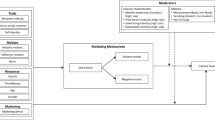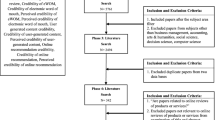Abstract
Although consumers increasingly claim to demand ethical products and state that they are willing to reward firms that are ethical, studies have highlighted that there is a significant gap between consumers’ explicit attitudes toward ethical products and their actual purchase behavior. This has major implications for firm policies revolving around business ethics. This research contributes to the understanding of the attitude–behavior gap in ethical consumption that literature has identified but not explored much. We utilize the model of dual attitudes as a basis for the arguments presented in the paper and test them. We suggest that the gap in ethical consumerism exists because individuals have implicit as well as explicit attitudes, which are impacted differentially by stimuli and elicit dissimilar behavioral responses and thus have different implications for business ethics policies. Two longitudinal studies are conducted to better understand the impact of an individual’s dual attitudes on preferences and choice. Our findings support the presence of dual attitudes in consumers. Explicit attitudes are found to be easily influenced by the nature of the stimuli. On the other hand, implicit attitudes are relatively unaffected by the nature of the stimuli present and remain relatively constant. Based on the findings, implicit attitudes guide behavior and determine an individual’s preferences. Even though explicit attitudes react to the stimuli presented, our findings suggest they have no impact on the choice of consumers. These findings improve the understanding of ethical consumption, provide a reason as to why the attitude–behavior gap exists, provide a foundation for future researchers and help firms better understand the impact of perceived business on creating a behavioral shift in ethical consumption.



Similar content being viewed by others
Notes
Results replicated on independent analyses on all five measures (a) respecting moral norms (p < .01) (b) adhering to the law (p < .01) (c) socially responsible brand (p = .01), (d) avoiding damaging behavior at all costs (p = .01) and (e) overall favorability (p < .01).
Data were also collected on intentions. Results were found to mirror those from preferences and hance have not been reported.
The subjects were asked about their preference for Diet-Coke, Original Coke and Coke Zero, and the chosen version was evaluated on preference.
Data were analyzed using multiple pooling options in the data. They were analyzed separately across all six conditions (3 stages × 2 conditions), by pooling across conditions and across stages. The results were identical with respect to parameter estimates across all models. For the sake of parsimony, only the results from the pooled regression are reported.
Abbreviations
- EA:
-
Explicit attitude
- IA:
-
Implicit attitude
- CPE:
-
Consumers’ perceived ethicality
- PREF:
-
Preference
- OLS:
-
Ordinary least squares
- IAT:
-
Implicit association test
- TP:
-
Time period
References
Ajzen, I. (1985). From intentions to actions: A theory of planned behavior. In J. Kuhl & J. Beckman (Eds.), Action-control: From cognition to behavior (pp. 11–39). Heidelberg: Springer.
Ajzen, I. (1991). The theory of planned behavior. Organizational Behavior and Human Decision Processes, 50, 179–211.
Bagozzi, Richard P. (1992). The self-regulation of attitudes, intentions, and behavior. Social Psychology Quarterly, 55(2), 178–204.
Bass, F. M., Pessemier, E. A., & Lehmann, D. R. (1972). An experimental study of relationships between attitudes, brand preference, and choice. Systems Research and Behavioral Science, 17(6), 532–541.
Boulstridge, E., & Carrigan, M. (2000). Do consumers really care about corporate responsibility? Highlighting the attitude–behavior gap. Journal of Communication Management, 4(4), 355–368.
Bray, J., Johns, N., & Kilburn, D. (2011). An exploratory study into the factors impeding ethical consumption. Journal of Business Ethics, 98, 597–608.
Brunk, K. H. (2012). Un/ethical company and brand perceptions: Conceptualising and operationalising consumer meanings. Journal of Business Ethics, 111, 551–565.
Campbell, W. K., Bosson, J. E., Goheen, T. W., Lakey, C. E., & Kernis, M. H. (2007). Do narcissists dislike themselves “deep down inside”? Psychological Science, 18(3), 227–229.
Carr, J., Lee, D., Scaife, A., & Hayes, I. (2013). Food statistics pocketbook. Department for Environment, Food and Rural Affairs. https://www.gov.uk/government/uploads/system/uploads/attachment_data/file/315418/foodpocketbook-2013update-29may14.pdf. Last Accessed Sept 26, 2014.
Carrigan, M., & Attalla, A. (2001). The Myth of the ethical consumer—Do ethics matter in purchase behavior? Journal of Consumer Marketing, 18(7), 560–577.
Carrington, M., Neville, A., & Whitewell, J. (2010). Why ethical consumers don’t walk their talk: Towards a framework for understanding the gap between the ethical purchase intentions and actual buying behavior of ethically minded consumers. Journal of Business Ethics, 97, 139–158.
Carrington, M., Neville, A., & Whitewell, J. (2014). Lost in translation: Exploring the ethical consumer intention–behavior gap. Journal of Business Research, 67(1), 2759–2767.
Caruana, R. (2007). A sociological perspective of consumption morality. Journal of Consumer Behaviour, 6(5), 287–304.
Caruana, R., Carrington, M. J., & Chatzidakis, A. (2016). Beyond the attitude–behaviour gap: Novel perspectives in consumer ethics: Introduction to the thematic symposium. Journal of Business Ethics, 136(2), 215–218.
Chung, J., & Monroe, G. S. (2003). Exploring social desirability bias. Journal of Business Ethics, 44(4), 291–302.
Clarke, M. (2012). Ethical Foods. International situation assessment, opportunities and threats. Australian Government, Rural Industries Research and Development Corporation https://rirdc.infoservices.com.au/items/11-147 Last Accessed Sept 26, 2014.
Cowe, R., & Williams, S. (2000). Who are the ethical consumers? Ethical consumerism report. London: Co-operative Bank.
Creyer, E. H., & Ross, W. T. (1997). The influence of firm behavior on purchase intention: Do consumers really care about business ethics? Journal of Consumer Marketing, 14(6), 421–432.
De Pelsmacker, P., Rayp, G., & Driesen, l. (2005). Do consumers care about ethics? Willingness to pay for fair-trade coffee. Journal of Consumer Affairs, 39, 363–385.
Dijksterhuis, A. (2010). Automaticity and the unconscious. In S. T. Fiske, D. T. Gilbert, & G. Lindzey (Eds.), Handbook of Social Psychology (pp. 228–267). Hoboken, NJ: Wiley.
Dimofte, C. V. (2010). Implicit measures of consumer cognition: A review. Journal of Psychology and Marketing, 27(10), 921–937.
Doane, D. (2001). Taking flight: The rapid growth of ethical consumerism. London: New Economics Foundation.
Eckhardt, G. M., Belk, R., & Devinney, T. M. (2010). Why don’t consumers consume ethically? Journal of Consumer Behaviour, 9, 426–436.
Egloff, B., & Schmukle, S. C. (2002). Predictive validity of an implicit association test for assessing anxiety. Journal of Personality and Social Psychology, 83, 1441–1455.
Fairtrade International. (2014). Strong producers, strong future annual report 2013–14. Fairtrade International. http://www.fairtrade.net/fileadmin/user_upload/content/2009/resources/2013-14_AnnualReport_FairtradeIntl_web.pdf. Last Accessed Sept 26, 2014.
Folkes, V. S., & Kamins, A. (1999). Effects of information about firms ethical and unethical actions on consumers’ attitudes. Journal of Consumer Psychology., 8(3), 243–259.
Garg, N., Wansink, B., & Inman, J. J. (2007). The influence of incidental affect on consumers’ food intake. Journal of Marketing, 71(1), 194–206.
Greenwald, A. G., McGhee, D. E., & Schwartz, J. L. K. (1998). Measuring individual differences in implicit cognition: The implicit association test. Journal of Personality and Social Psychology, 74(6), 1464–1480.
Hassan, L., Shaw, D., & Shui, E. (2015). Who says there is an intention-behaviour gap? Assessing the empirical evidence of an intention–behaviour gap in ethical consumption. Journal of Business Ethics, 136(2), 219–236.
Hunt, S. D., & Vitell, S. (1986). A general theory of marketing ethics. Journal of Macromarketing, 6(5), 5–16.
Inquisit 4.0.6.0. Computer Software. (2014). Seatlle. Millisecond Software: WA.
King, M. F., & Bruner, G. (2000). Social desirability bias: A neglected aspect of validity testing. Psychology & Marketing, 17(2), 79–103.
Kollmuss, A., & Agyeman, J. (2002). Mind the gap: Why do people act environmentally and what are the barriers to pro-environmental behavior? Environmental Education Research, 8(3), 239–260.
Luchs, M. G., Naylor, R. W., Irwin, J. R., & Raghunathan, R. (2010). The sustainability liability: Potential negative effects of ethicality on product preference. Journal of Marketing, 74(5), 18–31.
Markovic, S., Iglesias, O., Singh, J. J., & Sierra, V. (2015). How does the perceived ethicality of corporate services brands influence loyalty and positive word-of-mouth? Analyzing the roles of empathy, affective commitment, and perceived quality. Journal of Business Ethics. doi:10.1007/s10551-015-2985-6.
McCarthy, D. M., & Thompsen, D. M. (2006). Implicit and explicit measures of alcohol and smoking cognitions. Psychology of Addictive Behavior, 20(4), 436–444.
Merrill, J. (2013). Oxfam accuses Coke and Pepsi of taking land from the poor. The Independent UK. http://www.independent.co.uk/environment/green-living/oxfam-accuses-coke-and-pepsi-of-taking-land-from-the-poor-8852161.html. Last Accessed June 09, 2014.
Osborne, L. (2013). High-street fashion store Zara accused of using slave labour at factories in Argentina. Daily Mail. http://www.dailymail.co.uk/news/article-2303358/High-street-fashion-store-Zara-investigation-use-slave-labour-factories-Argentina.html. Last Accessed June 1, 2014.
Oxfam International. (2013). The Coca-Cola Company declares “zero tolerance” for land grabs in supply chain. Oxfam International. http://www.oxfam.org/en/grow/pressroom/pressrelease/2013-11-08/coca-cola-company-declares-zero-tolerance-land-grabs-supply-chain Last Accessed June 09, 2014.
Papaoikonomou, E., Ryan, G., & Ginieis, M. (2011a). Towards a holistic approach of the attitude–behavior gap in ethical consumer behaviors: Empirical evidence from Spain. International Advances in Economic Research, 17, 77–88.
Papaoikonomou, E., Ryan, G., & Valverde, M. (2011b). Mapping ethical consumer behavior: Integrating the empirical research and identifying future directions. Ethics & Behavior, 21(3), 197–221.
Perugini, M. (2005). Predictive models of implicit and explicit attitudes. British Journal of Social Psychology, 44, 29–45.
Petty, R. E., Wheeler, S. C., & Tormala, Z. L. (2003). Persuasion and attitude change. In T. Mellon & M. J. Lerner (Eds.), Handbook of Psychology: Personality and Social Psychology (Vol. 5, pp. 353–382). Hoboken, NJ: Wiley.
Revenues of Fairtrade International Products Worldwide from 2004 to 2014 (in Million Euros). (2016). Retrieved from https://www.statista.com/statistics/271354/revenue-of-fair-trade-products-worldwide-since-2004/
Reynolds, S. J., Leavitt, K., & DeCelles, K. A. (2010). Automatic ethics: The effects of implicit assumptions and contextual cues on moral behavior. Journal of Applied Psychology, 95(4), 752–760.
Rydell, R. J., & McConnell, A. R. (2006). Understanding implicit and explicit attitude change: A systems of reasoning analysis. Journal of Personality and Social Psychology, 91(6), 995.
Sen, S., & Bhattacharya, C. B. (2001). Does doing good always lead to doing better? Consumer reactions to corporate social responsibility. Journal of Marketing Research, 38(2), 225–243.
Shaw, D., Newholm, T., & Dickinson, R. (2006). Consumption as voting: An exploration of consumer empowerment. European Journal of Marketing, 40(9/10), 1049–1067.
Sheeran, P. (2002). Intention–behavior relations: A conceptual and empirical review. European Review of Social Psychology, 12(1), 1–36.
Shiv, B., & Fedorikhin, A. (1999). Heart and mind in conflict: The interplay of affect and cognition in consumer decision making. Journal of consumer Research, 26(3), 278–292.
Singh, J. J., Iglesias, O., & Foguet, J. M. B. (2012). Does having an ethical brand matter? The influence of consumer perceived ethicality on trust, affect and loyalty. Journal of Business Ethics, 111, 541–549.
Sriram, N., & Greenwald, A. G. (2009). The brief implicit association test. Experimental Psychology, 56(4), 283–294.
Wilson, T. D., Lindsey, S., & Schooler, T. Y. (2000). A model of dual attitudes. Psychological Review, 107, 101–126.
Author information
Authors and Affiliations
Corresponding author
Ethics declarations
Conflict of interest
The authors Rahul Govind, Jatinder Jit Singh, Nitika Garg and Shachi D’Silva declare that they have no conflict of interests.
Ethical Approval
All procedures performed in studies involving human participants were in accordance with the ethical standards of the institutional and/or national research committee and with the 1964 Declaration of Helsinki and its later amendments or comparable ethical standards.
Informed Consent
Informed consent was obtained from all individual participants included in the study.
Appendix: Implicit Association Test Stimuli
Appendix: Implicit Association Test Stimuli

Images: Coca-Cola (target)

Images: Fairtrade (target)
Positive and negative words—attribute
Positive | Negative |
|---|---|
Pleasant | Unpleasant |
Helpful | Unhelpful |
Fair | Irresponsible |
Environmentally friendly | Harmful |
Sustainable | Degradation |
Thoughtful | Unfair |
Equality | Inequality |
Rights and permissions
About this article
Cite this article
Govind, R., Singh, J.J., Garg, N. et al. Not Walking the Walk: How Dual Attitudes Influence Behavioral Outcomes in Ethical Consumption. J Bus Ethics 155, 1195–1214 (2019). https://doi.org/10.1007/s10551-017-3545-z
Received:
Accepted:
Published:
Issue Date:
DOI: https://doi.org/10.1007/s10551-017-3545-z




